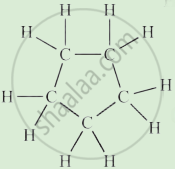Advertisements
Advertisements
Questions
State the reason to explain why covalent compounds "are bad conductors of electricity".
Give reason for the following:
Covalent compounds are bad conductors of electricity.
Solution
In covalent compounds, electrons are stuck in the links between atoms instead of being able to move around freely. These molecules can't carry electricity without free ions or electrons that aren't stuck in one place.
APPEARS IN
RELATED QUESTIONS
State the reason to explain why covalent compounds "have low melting and boiling points."
Name the following:
The property of element by virtue of which atoms of the element can link to each other in the form of a long chain or ring structure.
What type of bonds are present in CH4 molecule? Draw their electron-dot structures.
Give one example of a molecule containing a double covalent bond
How buckminsterfullerene is it related to diamond and graphite?
Draw the electron-dot structure of a hydrogen chloride molecule.
What type of bonding would you expect between Carbon and Chlorine?
The molecules having triple bond in them are:
(a) oxygen and ethyne
(b) carbon dioxide and ammonia
(c) methane and ethene
(d) nitrogen and ethyne
For each compound mentioned above give the formulae of ions formed in aqueous solution.
Complete the following:
In case of non-polar covalent bond, the covalent bond is formed in the ______ of atoms and shared electrons are ______ distributed. (corner, middle, equally, unequally)
Write answer as directed.
Saturated hydrocarbons are classified into three types. Write these names giving one example each.
Explain the following:
Polar covalent compounds are good conductors of electricity.
Elements Q and S react together to form an ionic compound. Under normal conditions, which physical state will the compound QS exist in?
Explain the following:
Water is a polar covalent molecule.
Explain covalent bond with example.
Complete the following activity.
Write the names of the hydrocarbons for the following structural formula.
(isobutylene, cyclohexane, propene, cyclohexene, cyclopentane, benzene, propyne, isobutane, propane)
 |
Cation is formed when ______.
A molecule of ammonia (NH3) has
State the reasons, why carbon cannot
- Lose four electrons to form C4+ cation and
- Gain four electrons to form C4- anion.
How does carbon overcome this problem to form compounds?
Assertion (A): Melting point and boiling point of ethanol are lower than that of sodium chloride.
Reason (R): The forces of attraction between the molecules of ionic compounds are very strong.
